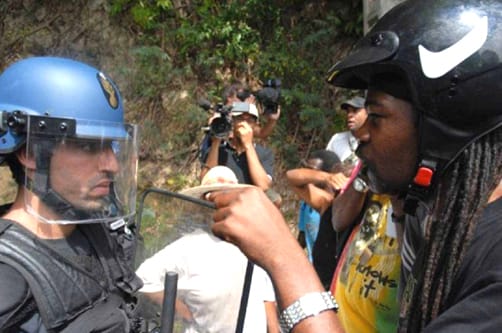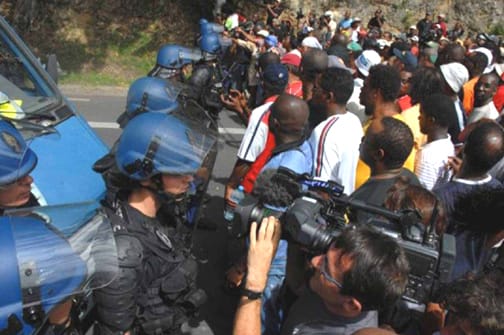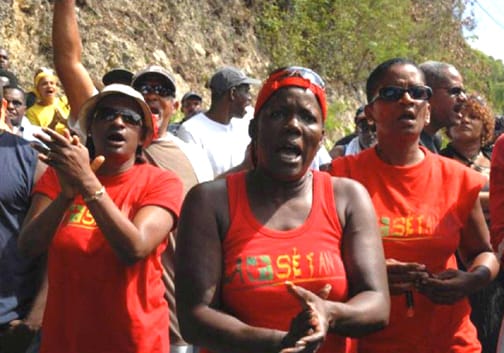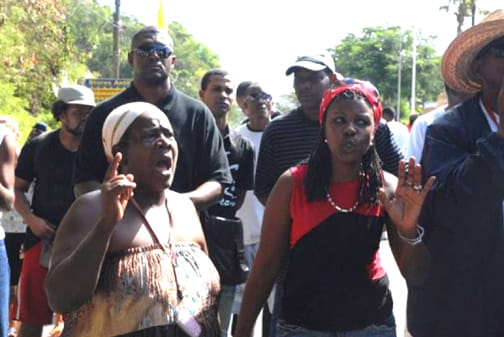General strike against the economic crisis hits Guadeloupe and Martinique
by Abayomi Azikiwe, Pan-African News Wire

The strike began on Jan. 20 amid rising prices and worsening living conditions among the masses in these islands located some 600 km from the Dominican Republic and Haiti and 7,000 km away from mainland France. On Feb. 14, the leader of the Collective Against Exploitation (LKP), a coalition of unions and political parties that have carried out the strike, has accused the French government of sending riot police to Guadeloupe in order to assassinate its organizers.
“Today, given the number of gendarmes who have arrived in Guadeloupe armed to the teeth, the French state has chosen its natural path: to kill Guadeloupeans as usual,” says Elie Domota. Domota, who is the leader of the LKP, is also the secretary general of the General Union of Guadeloupe Workers (UGTG).

Citing the historic role of France in maintaining political and economic control of the tropical islands, Domota said, “Every time there have been demonstrations in Guadeloupe to demand pay raises, the response of the state has been repression, notably in May 1967 in Pointe-a-Pitre, where there were 100 deaths of building workers massacred by the gendarmes.”
On Feb. 16, the French colonial authorities arrested approximately 50 organizers and leaders of the LKP. In an appeal issued by the strike committee leadership, they convey the determination of the Sarkozy government to break the strike:
“As he had promised, Jego (the French minister appointed to end the strike) has decided to slam down on LKP and on the people of Gwadloup. In this sense, the repressive forces are hitting as hard as they can. They have already arrested some 10 people in the town of Gosier and two in Sainte Rose, whether they were demonstrators or just passers-by.
“Besides, an entire battalion has been detailed to surround some 50 people (demonstrators or passers-by) still in the town of Gosier; they are closing in, obviously meaning to hit them and arrest them.”

“According to our information, it’s the youth who first made a call” to the police for help, he said. “The police refused to come …. Meanwhile, our comrade was losing blood and dying.” Some 3,000 mourners turned Bino’s funeral on Sunday, Feb. 22, into a political demonstration, demanding higher wages and respect from the French government.
Mediapart published a letter the next day sent from the hospital bed of Alex Lollia, a philosophy teacher and a member of LKP, recounting his experiences of police violence and racism on the night of Feb. 16. The letter said Lollia and his trade union comrades “were doing everything in our power to keep things calm and to steward the demonstrators …. [W]e experienced a tornado of baton blows when we had already left the side of the main road …. They surrounded me ….
“While I was being kicked in the stomach as I lay on the ground, they said, ‘We saw your filthy face on the telly; we’ll smash it for you so you can’t show it anymore. We’ll smash you filthy niggers, nigger dogs.'”
The letter continued, “I saw them dragging a woman from the neighborhood by the hair who was showing her indignation because they beat me.”
On Feb. 14, thousands of workers demonstrated in the town of Le Moule. The marchers walked through the area chanting, “Guadeloupe is ours, it’s not theirs.”
This slogan, of course, related to the economic dominance of the white French minority known as “Bekes.” It is this class of the population that exercises effective control over the more than 400,000 Africans who were brought to the islands during 18th and 19th centuries as slaves.
Social apartheid in the French colony
A French member of parliament with the overseas department of French Guiana on the South American continent said on Feb. 15 that the conditions in Guadeloupe are “not far from social apartheid. In an interview with Le Journal du Dimanche, Christine Taubira stated that “the leaders of the LKP are not anti-white racists. They are exposing a reality … a caste holds economic power and abuses it.”
The strike has closed most shops, restaurants, schools, banks and government offices. France has adamantly refused to grant the majority of the demands of the LKP, particularly a monthly raise of EUR200 ($259US) for the 45,000 poorest workers.

On Feb. 14, a mass demonstration in the capital of Martinique demanded greater economic and political power for the African majority. The French elite, who are the descendants of the former plantation owners in Martinique, still control the economic institutions that make up the basis of the domestic and foreign trade.
The “Bekes,” who only comprise 1 percent of the population, which is officially stated at 401,000, still control the economy as a whole. An Associated Press article on Feb. 16 points out, “Many working class families are struggling to make ends meet amid a global economic crisis, exposing racial tensions 160 years after slavery ended in Martinique.”
In addition, the article notes, “Police say the protests remain peaceful, and 130 riot police arrived from France this week to keep order.”
This nonetheless goes on to emphasize that the situation has not become seriously violent, “But racial sentiments were inflamed after a one-hour documentary, ‘The last owners of Martinique,’ was shown on TV last week. The program focused on how the white minority group has dominated the economy.”
An Associated Press article published on Feb. 10 highlights the mass demonstrations and work stoppages that have been taking place in Martinique. “University students and artisans in the French Caribbean island of Martinique are protesting the high cost of living,” the AP article reports.
“All major commercial centers, gas stations and businesses remained closed on Tuesday (Feb. 10) as the protest entered its sixth day. Government officials have met with protesters, who demand a 30 percent overall reduction in prices. Union leaders have said they would agree to a 10 percent reduction among some products. No agreement has been reached.
“Police have said that 11,000 protesters crowded the streets of Martinique’s capital. Union leaders say it was more than double that number.”
In Guadeloupe, since Jan. 20, 47 trade unions, associations and political parties have refused to work and attend schools. A demonstration of 25,000 people was held on Jan. 24.
Some of the 146 demands put forward by the LKP include the reduction of fuel prices by 50 percent, the lowering of prices for transport services and water, an immediate freeze on rents, more job security for temporary employees, greater educational opportunities for youth and an end to racism in employment practices.
Guadeloupe has been a French colony since 1812. Although the island was ostensibly integrated into the French state after World War II in 1946, the country has remained in poverty.
Unemployment stands officially at 23 percent and the price of necessities are between 30 and 60 percent higher than what prevails in France. A report issued on Feb. 16 by the European statistics agency, Eurostats, documents that the French Overseas territories had some of the highest unemployment rates in the European Union.
In this regard, “The Indian Ocean island of Reunion topped the list, with 25.2 percent, followed by Guadeloupe, Martinique and French Guiana, all in the Caribbean region.
“The two Spanish enclaves in Morocco – Ceuta and Melilla – came next, with rates of 20.3 percent and 18.2 percent, respectively,” the BBC reported on Feb. 16.
Guadeloupe is a recognized region of France and is controlled by the local council, dominated by the French Socialist Party (PS). Even though the PS is in opposition to the Conservative government of Sarkozy, no real solidarity efforts have been forthcoming for the workers in Guadeloupe.
Cynthia McKinney, MXGM express solidarity
In the United States, former congresswoman from Georgia and Green Party candidate for president in 2008, Cynthia McKinney, issued a statement of support to the workers in Guadeloupe on Feb. 7.
McKinney said in part: “I call on the authorities in Guadeloupe and in France to heed the workers’ and people’s just demands – and I urge the authorities to refrain from using any form of intimidation, pressure or repression against this powerful movement.”
The former congresswoman pointed out: “The eyes of the world are focused on Guadeloupe. Israel has shown the world that the massive use of force does not ensure victory. Indeed, it is counter-productive.”
McKinney also states: “Any use of force by the authorities against people exercising their rights is not acceptable. It is not by repression and the deployment of police and shock troops that a solution will be found.”
The Malcolm X Grassroots Movement (MXGM) also issued a statement on Feb. 13 in solidarity with the people of Guadeloupe and warned the French government to refrain from inflicting human rights violations on the workers engaging in economic and political struggles.
‘Any use of force by the authorities against people exercising their rights is not acceptable. It is not by repression and the deployment of police and shock troops that a solution will be found.’ – Cynthia McKinney
The statement reads: “The Malcolm X Grassroots Movement (MXGM) denounces in the strongest terms the threatening posture of the French government to the peoples of Guadaloupe and Martinique. We will not sit idly by and let the French government continue to treat our brothers and sisters as colonial subjects, or worse.”
The organization declares, “We stand in full support of the just demands of the people’s movements of Guadaloupe and Martinique for economic, social and cultural rights, human dignity and self-determination.
“MXGM serves notice to the French government that the resolution to the crisis in Guadaloupe and Martinique can only be addressed through diplomatic means in full accord with international law.”
The need for international solidarity
Although the one day strike by French workers on Jan. 29 received some press coverage in the United States, the events in Guadeloupe and Martinique have gone largely unnoticed by the corporate-controlled media. Both of these actions represent the workers’ response to the burgeoning economic crisis engendered by capitalist overproduction.

Despite the disadvantaged conditions that the masses in Guadeloupe are struggling against, they are pointing the way for the coming struggles of working class people throughout the capitalist world. The building of a united front, the coming together of trade unions and peoples’ organizations is key in any process aimed at fighting against the current crisis in world capitalism.
How you can help
The International Liaison Committee of Workers & Peoples (ILC) urges all supporters of democratic rights to send protest statements to the French Embassy in Washington, D.C., to demand that the demands of the people of Guadeloupe and Martinique be met. Tell them:
“We call on you and on the French government to 1) withdraw all special riot police and troops sent to Guadeloupe, 2) put a halt to any and all forms of repression against the striking population, 3) return to the negotiating table with the LKP Strike Collective and 4) heed their legitimate demands, beginning with an immediate 200 Euro increase in the minimum wage.
Call (202) 944-6000, fax (202) 944-6072 or email info@ambafrance-us.org. Please send a copy of your statement to ugtg@wanadoo.fr and ilcinfo@earthlink.net.
Abayomi Azikiwe is the editor of the Pan-African News Wire. Azikiwe has been following the current situation in Guadeloupe and Martinique over the last several weeks. Bay View staff contributed to this story.





